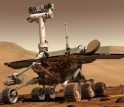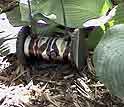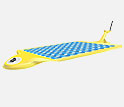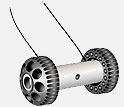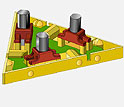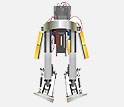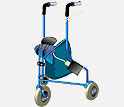Media Advisory 05-017
Robots: An Exhibition of U.S. Automatons from the Leading Edge of Research
Machines highlight the WTEC International Study of Robotics
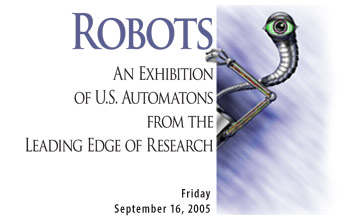
On Sept. 16, NSF will host an exhibition of robotics research.
September 6, 2005
This material is available primarily for archival purposes. Telephone numbers or other contact information may be out of date; please see current contact information at media contacts.
Demonstrations from 11:30 a.m. - 2:30 p.m. are for media only and require registration. Public demonstrations begin at 2:30 p.m. and run through 5:00 p.m. Public demonstrations do not require registration.
The webcast link, exhibit descriptions, images and other event materials can be found at: http://www.nsf.gov/news/newsmedia/robotics05/index.jsp
On Sept. 16, the National Science Foundation (NSF) will host more than a dozen robots and their creators to showcase advanced robotics technology from across the nation.
From a learning humanoid head to a full-scale mockup of the Mars Exploration Rover, robots will spend the day flying, hopping, scooting and just showing off.
The robots are here to highlight U.S.-funded robotics research and the findings of a new study, the World Technology Evaluation Center International Study of Robotics. The report culminates a nearly 2-year effort to evaluate robotics research and development in the United States, Japan, Korea and Western Europe.
The findings for the United States are not all positive. U.S. researchers have developed advanced robotics, but national strategies and coordinated funding efforts in other countries pose a serious challenge to U.S. competitiveness. While our nation leads in such areas as robot-assisted surgery and mobile, space robots, foreign laboratories are developing the state-of-the-art service and industrial robots — in some cases overtaking the United States in fields we once dominated.
Similar trends exist across the six different categories of the report: Robotic Vehicles; Space Robotics; Industrial, Service and Personal Robots; Humanoid Robots; Robotics in Biology and Medicine; and Networked Robots.
Sponsored by NSF, NASA and the National Institutes of Health, the report was drafted by a panel of six robotics experts who visited more than 50 research sites across the globe.
A daylong workshop will present the detailed report findings, while a webcast media briefing will provide a concise summary for the media. Panel chair George Bekey, of the University of Southern California, will present the summary, after which all six panelists will be available to answer questions.
Researchers will demonstrate robots exclusively to the media beginning at 1:00 p.m., with all rooms opening for media previews at 11:30 a.m. The demonstrations, including opportunities for visitors to control some of the robots, are open to the public from 2:30 - 5:00 p.m.
Report details will be available in a press packet, as will broadcast-quality b-roll and high-resolution still images. Due to space limitations, please register in advance. Please contact Josh Chamot, NSF Media Officer for Engineering, at jchamot@nsf.gov or (703) 292-7730.
| What: | News briefing and demonstrations highlighting U.S. robotics R&D and the WTEC International Study of Robotics |
| Who: | George Bekey, University of Southern California Robert Ambrose, NASA/JSC Vijay Kumar, University of Pennsylvania Art Sanderson, Rensselaer Polytechnic Institute Brian Wilcox, NASA/JPL Yuan Zheng, Ohio State University |
| When: | Friday, Sept. 16, 2005 Preview: 11:30 a.m. Webcast Briefing: 12:00 - 1:00 p.m. Media Demonstrations: 1:00 - 2:30 p.m. Public Demonstrations: 2:30 - 5:00 p.m. WTEC Workshop: 8:00 a.m. - 3:00 p.m. |
| Where: | National Science Foundation Briefing will be held in Room 110 For directions, see: http://www.nsf.gov/about/visit/ |
| Call-in Questions: | USA Toll Free Number -- 1-888-455-3612 and the code word is Robotics. |
-NSF-
-
The University of Southern California Humanoid Robot Head.
Credit and Larger Version -
A full-scale mockup of the Mars Exploration Rover will be on display at the NSF robotics exhibition.
Credit and Larger Version -
View Video
This video demonstrates the capabilities of the rugged, quick, robotic spy, Scout.
Credit and Larger Version -
View Video
Rensselaer Polytechnic Institute Solar-Powered Autonomous Underwater Vehicle (SAUV)
Credit and Larger Version -
View Video
University of Minnesota COTS-M Scout Robot
Credit and Larger Version -
View Video
University of Washington Self-Assembling Robotics
Credit and Larger Version -
View Video
Massachusetts Institute of Technology Bipedal Walking Robot
Credit and Larger Version -
View Video
University of Virginia COOL Aide: Robotics Assistance for the Elderly
Credit and Larger Version
Media Contacts
Joshua A. Chamot, NSF, (703) 292-7730, email: jchamot@nsf.gov
The U.S. National Science Foundation propels the nation forward by advancing fundamental research in all fields of science and engineering. NSF supports research and people by providing facilities, instruments and funding to support their ingenuity and sustain the U.S. as a global leader in research and innovation. With a fiscal year 2023 budget of $9.5 billion, NSF funds reach all 50 states through grants to nearly 2,000 colleges, universities and institutions. Each year, NSF receives more than 40,000 competitive proposals and makes about 11,000 new awards. Those awards include support for cooperative research with industry, Arctic and Antarctic research and operations, and U.S. participation in international scientific efforts.
Connect with us online
NSF website: nsf.gov
NSF News: nsf.gov/news
For News Media: nsf.gov/news/newsroom
Statistics: nsf.gov/statistics/
Awards database: nsf.gov/awardsearch/
Follow us on social
Twitter: twitter.com/NSF
Facebook: facebook.com/US.NSF
Instagram: instagram.com/nsfgov




